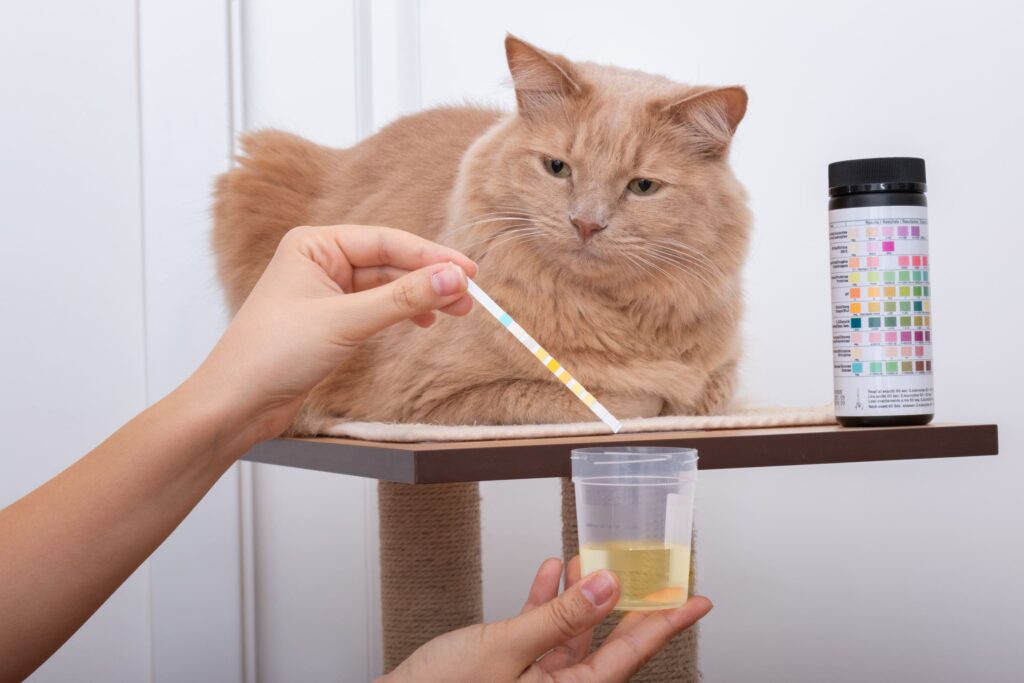What Are Warning Signs of Urinary Obstruction in Cats?

Urinary blockages are serious emergencies, quickly becoming life-threatening to your feline friend. At McKinney Emergency Veterinarian Clinic, our skilled and experienced team may recommend emergency surgery to provide prompt relief and prevent the recurrence of blockages. We’re here to support your furry companion’s health every step of the way.
Understanding Urinary Obstruction in Cats
A urinary obstruction in a cat is a serious medical emergency requiring immediate intervention. It occurs when the urethra, the thin tube that carries urine from the bladder to the outside of the body, becomes obstructed, preventing the passage of urine. This causes a dangerous buildup of toxins in the body, leading to serious complications, including kidney failure, sepsis, and even death.
Urinary obstructions typically occur due to the plugs of small stones, crystals, blood clots, or proteins becoming wedged in the urethra. The life-threatening condition is more common in male cats due to their narrower urethras, which can be easily blocked. Some have partial blockages, while others may have complete blockages.
What Are Warning Signs of Urinary Obstructions?
The following are some warning signs of urinary obstruction in cats:
- Straining to Urinate: Your feline companion may spend a long time in the litter box, pushing and straining but producing little or no urine. They may also vocalize, expressing pain or discomfort.
- Frequent Trips to the Litter Box: Your furry friend may go to the litter box more often than usual but with little success. The irritation of the urinary tract gives your cat the sensation of needing to urinate more often.
- Decrease in Urine Output: You may notice a significant decrease in the amount of urine your cat produces. The less the urine, the more the toxin buildup in your furry friend’s body.
- Bloody or Cloudy Urine: You may notice a small amount of blood or cloudiness in the urine, which may result from irritation caused by the obstruction. It may also indicate irritation or damage to the bladder or urethra.
- Vomiting and Loss of Appetite: Vomiting can occur as a result of toxins building up in the body due to the obstruction. Your furry companion may also lose interest in eating or drinking.
- Pain and Restlessness: Your cat may show signs of discomfort and may seem unable to settle comfortably. Your furry friend may hide or appear more withdrawn than usual due to pain.
- Lethargy: Your cat may seem less active and more tired than usual. Lethargy can worsen rapidly as the urinary obstruction causes complications.
- Abdominal Pain: Your cat may vocalize if you touch their belly. Abdominal pain can be a sign of a distended bladder or other internal problems.
If you notice any of these warning signs of urinary obstruction, it’s important to seek emergency veterinary care. Urinary obstructions are a life-threatening condition, and prompt treatment is essential to prevent complications like kidney damage or bladder rupture.
Additional Tips for Preventing Urinary Obstructions in Cats
The following are ways you can reduce the risk of urinary obstructions in cats:
- Encourage Water Intake: Drinking plenty of water can help dilute the urine and flush out any crystals or debris that may cause obstructions. Your cat may need a little encouragement to maintain adequate water intake, so consider using a water fountain to entice your cat to drink more.
- Maintain a High-Quality, Healthy Diet: Feed your cat a high-quality diet rich in nutrients needed to stay healthy. Aside from your cat’s overall health, a healthy diet will promote a healthier urinary tract.
- Regular Vet Visits: Schedule regular check-ups with your veterinarian to monitor your cat’s health and address potential issues early on. Preventive care is the best way to keep urinary obstructions and other health problems at bay.
Emergency Surgery Near Me in McKinney, TX
At McKinney Emergency Veterinarian Clinic, we offer life-saving surgery to address your furry companion’s emergency healthcare needs. If your cat is experiencing warning signs of urinary obstruction, make sure to contact us for immediate care. You can always count on our compassionate team for care and service that exceeds your expectations.
If your pet experiences an emergency, please contact us at 469-820-0233. We are dedicated to providing the best possible care to household pets in McKinney, TX, and the surrounding communities.
